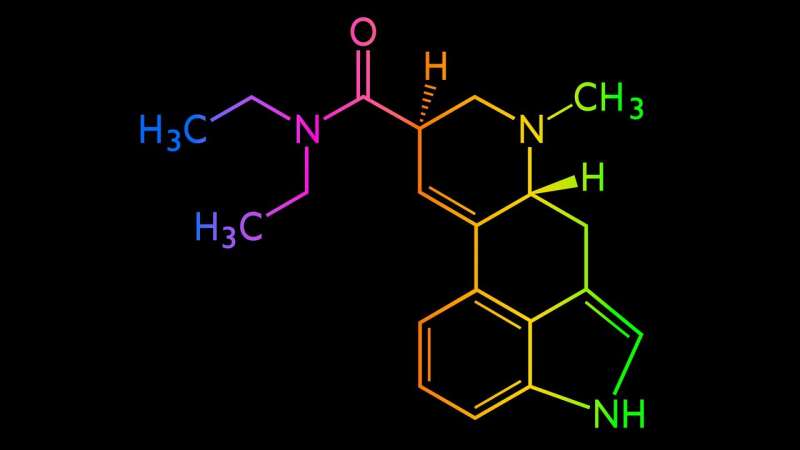October 17, 2023 report
This article has been reviewed according to Science X's editorial process and policies. Editors have highlighted the following attributes while ensuring the content's credibility:
fact-checked
peer-reviewed publication
trusted source
proofread
LSD use is on the rise, most prevalently among the depressed

Research led by the New York State Psychiatric Institute, New York, has looked into non-medical lysergic acid diethylamide (LSD) use by people with major depression status and their sociodemographic characteristics.
In a paper, "Use of Lysergic Acid Diethylamide by Major Depression Status," published in JAMA Psychiatry, the researchers detail the finding of disproportionate increases in the prevalence of LSD use among US adults with depression.
The study used data from the National Survey on Drug Use and Health (NSDUH), including responses from 478,492 adults aged 18 or older, collected from 2008 through 2019. The prevalence of past-year major depression diagnoses was determined based on DSM-IV criteria.
LSD use in the overall population rose 450% from 0.2% to 0.9%. Among those with depression, prevalence rose from 0.5% to 1.8% during the same period. Disproportionate increases in LSD use among those with depression were observed across various sociodemographic subgroups, including income levels.
There has been renewed interest in the clinical potential of hallucinogens, including LSD, for treating psychiatric or substance use disorders. This resurgence is partly due to research and media reports suggesting the therapeutic benefits of psychedelics.
As research on the therapeutic potential of LSD continues, the paper suggests it is important for public health efforts to promote safe and evidence-based use of psychedelics. The study highlights the need for further research to understand the motivations for LSD use and the relationship between non-medical LSD use and depression.
The NSDUH survey used in the study does not ask respondents about motives for LSD use, so the current study cannot attribute use trends to specific causes. The survey also lacks information about the dosing amount taken by respondents, which could differentiate between micro-dosing and more intense or prolonged tripping.
Among individuals with depression who also report LSD use, the authors suggest that clinicians should be informed enough to discuss potential strategies for mitigating harm and maximizing benefits in medically unsupervised settings. The last point is critical as, with any illegal or unregulated substance use, simply ignoring the cause and circumstances around use does not serve patient interests.
The authors point out that LSD carries lower risks to physical health or dependence than other non-medical drug substances. Yet, individuals with depression are more likely to experience adverse events, such as paranoia or a "bad trip," when using LSD non-medically.
The paper falls short of making any recommendations or guidelines for a "good trip" or how clinicians could maximize the benefits of unsupervised LSD use but does suggest that future research with more in-depth survey questions could elucidate some of those strategies.
More information: Claire A. Walsh et al, Use of Lysergic Acid Diethylamide by Major Depression Status, JAMA Psychiatry (2023). DOI: 10.1001/jamapsychiatry.2023.3867
© 2023 Science X Network




















